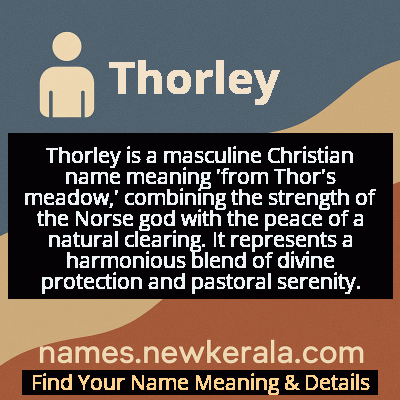Thorley Name Meaning & Details
Origin, Popularity, Numerology Analysis & Name Meaning of Thorley
Discover the origin, meaning, and cultural significance of the name THORLEY. Delve into its historical roots and explore the lasting impact it has had on communities and traditions.
Name
Thorley
Gender
Male
Origin
Christian
Lucky Number
4
Meaning of the Name - Thorley
Thorley is a masculine Christian name meaning 'from Thor's meadow,' combining the strength of the Norse god with the peace of a natural clearing. It represents a harmonious blend of divine protection and pastoral serenity.
Thorley - Complete Numerology Analysis
Your Numerology Number
Based on Pythagorean Numerology System
Ruling Planet
Uranus (Rahu)
Positive Nature
Strong sense of order, loyal, practical, and disciplined.
Negative Traits
Stubborn, overly serious, rigid, and prone to feeling restricted.
Lucky Colours
Blue, gray.
Lucky Days
Saturday.
Lucky Stones
Blue sapphire.
Harmony Numbers
1, 7, 8.
Best Suited Professions
Managers, engineers, accountants, organizers.
What People Like About You
Dependability, discipline, practicality.
Famous People Named Thorley
Thorley Walters
Actor
Prolific British character actor with over 100 film and television credits
Thorley Smith
Racing Driver
Pioneering British motorsport competitor and engineer in early 20th century
Thorley Riches
Architect
Influential Australian architect of significant Victorian-era buildings
Name Variations & International Equivalents
Click on blue names to explore their detailed meanings. Gray names with will be available soon.
Cultural & Historical Significance
The name's journey from surname to given name illustrates the English tradition of using occupational or locational surnames as first names. This practice became particularly popular during the Victorian era when there was renewed interest in genealogy and family history. Thorley's continued, though rare, usage demonstrates how names can carry historical memory across generations, preserving cultural connections to both Norse ancestry and English rural life. The Christian adoption of such names shows the religion's capacity to incorporate and transform pre-existing cultural symbols.
Extended Personality Analysis
Individuals named Thorley often exhibit a blend of strength and gentleness, reflecting the name's dual nature of divine power and pastoral peace. They tend to be reliable, grounded people with an inner resilience that helps them navigate challenges effectively. Typically, Thorleys are seen as protective figures who value stability and tradition, yet possess the courage to stand up for what they believe in. Their personality often balances leadership qualities with a nurturing disposition, making them both respected and approachable.
Many Thorleys demonstrate practical wisdom and a strong connection to nature or community, embodying the meadow's symbolism of growth and the thunder god's association with protection and authority. They often excel in roles that require both strength and sensitivity, such as teaching, healthcare, or community leadership. Their approach to problems tends to be methodical and grounded, combining thoughtful consideration with decisive action when necessary. The name suggests someone who builds rather than destroys, protects rather than attacks, and cultivates relationships and environments where people and projects can flourish.
Modern Usage & Popularity
In contemporary naming practices, Thorley remains a distinctive choice that appeals to parents seeking a name with historical depth and unique character without being overly exotic. It maintains a steady, though rare, presence primarily in English-speaking countries with strong historical connections to England, particularly the United Kingdom, Australia, and parts of North America. The name has experienced minor revivals during periods of increased interest in Norse mythology and historical names, but remains firmly in the category of uncommon traditional names rather than trending modern choices. Its usage is often tied to family heritage or a desire for a name that conveys strength and tradition while avoiding common popularity. Recent years have seen a slight increase in its use as parents increasingly seek unique yet meaningful names with historical roots.
Symbolic & Spiritual Meanings
Symbolically, Thorley represents the harmonious union of power and peace, strength and serenity. The thunder god element symbolizes protection, authority, and the ability to weather life's storms, while the meadow represents growth, fertility, and peaceful abundance. This combination suggests someone who can provide strong leadership while maintaining a connection to nature and community. The name carries connotations of grounded strength - not aggressive dominance but reliable protection that allows for growth and flourishing. It symbolizes the ideal of being a shelter in times of trouble while fostering harmony and productivity in peaceful times, making it a name that embodies balanced leadership and nurturing strength. The symbolic meaning extends to representing the transformation of raw power into constructive force, much like how thunderstorm rains nourish the meadow they fall upon.

